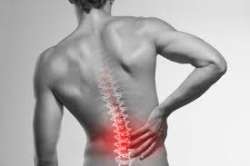Here's how early physical therapy can help to reduce back pain
Currently, patients with low-back pain are given painkillers, X rays and, in some cases, told to rest.

Are you in a world of pain? You're not alone. Four in five people suffer from an achy, breaky back. It all begins as a twinge. Then the pain stars to radiate down your back when you try to stoop down. So, what can be done? Try early physical therapy as it can be beneficial for those experiencing lower-back pain, a study suggests.
The study found that those who saw a physical therapist at the first point of care had an 89 percent lower probability of receiving an opioid prescription, a 28 percent lower probability of having advanced imaging services, and a 15 percent lower probability of an emergency department visit - but a 19 percent higher probability of hospitalisation.
The authors noted that a higher probability of hospitalisation is not necessarily a bad outcome if physical therapists are appropriately referring patients to specialised care when low back pain is not resolved by addressing potential musculoskeletal causes first.
These patients also had significantly lower out-of-pocket costs.
"Given our findings in light of the national opioid crisis, state policymakers, insurers, and providers may want to review current policies and reduce barriers to early and frequent access to physical therapists as well as to educate patients about the potential benefits of seeing a physical therapist first," said lead author Dr. Bianca Frogner.
Frogner said individuals in all 50 states have the right to seek some level of care from a physical therapist without seeking a physician referral, however, many do not take advantage of this option. She said this may be because some insurance companies have further requirements for payment.
Currently, patients with low-back pain are given painkillers, X rays and, in some cases, told to rest, said Frogner. She said seeing a physical therapist first and given exercise is a more evidence-based approach.
"This study shows the importance of interprofessional collaboration when studying complex problems such as low-back pain. We found important relationships among physical therapy intervention, utilisation, and cost of services and the effect on opioid prescriptions," said Dr Ken Harwood.
The study appears in the journal Health Services Research
(With ANI Inputs)